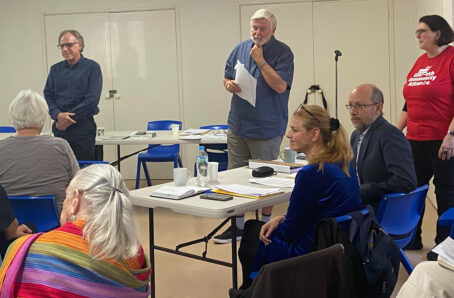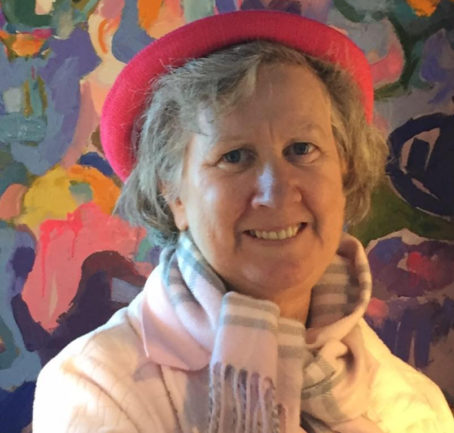The UN’s special rapporteur on toxics and human rights, Marcos Orellana, visited the community of Chain Valley Bay on August 29 as part of a ten day visit to Australia to examine the human rights related to environmentally sound management and disposal of hazardous substances and waste in Australia.
The Chain Valley Bay community hall was packed with locals who, along with Mr Orellana, heard numerous stories from locals about the effects of coal ash from Vales Point power station and perceived shortcomings from the NSW Government’s Environment Protection Agency and the lack of action from government on recommendations from public inquiries.
Mr Orellana spent ten days in Australia meeting with Federal, State, and Territory Government authorities, non-governmental and civil society organisations, academic experts and scientists, individuals and communities including the Central Coast’s community.
He visited the Australian Capital Territory, Canberra, NSW, Tasmania, Victoria, South Australia, and Western Australia.
Marcos A. Orellana is the Special Rapporteur on the implications for human rights of the environmentally sound management and disposal of hazardous substances and wastes.
The Special Rapporteurs are part of what is known as the Special Procedures of the Human Rights Council.
Special Procedures, the largest body of independent experts in the UN Human Rights system, is the general name of the Council’s independent fact-finding and monitoring mechanisms that address either specific country situations or thematic issues in all parts of the world.
Special Procedures’ experts work on a voluntary basis; they are not UN staff and do not receive a salary for their work.
They are independent from any government or organization and serve in their individual capacity.
Below is Mr Orellana’s press release after a press conference in Sydney before he left Australia.
Australia: Deep divide between Government and community narratives on toxics fuels anger and distrust, says UN expert
“Sydney (8 September 2022) – Where the Australian Government sees efforts towards stronger regulations to address the risks of chemicals and pollution, communities and civil society denounce the capture of the State for the benefit of mining, oil, gas, agrochemical and other corporate interests, said Marcos Orellana, UN Special Rapporteur on toxics and human rights.
“Draconian restrictions on the right to peaceful protest in several states aggravate the distance between State and society,” said Orellana.
In his statement, Orellana examines how toxic releases from coal mines and coal-fired power plants, uranium mines, and the spraying of highly hazardous pesticides are imposing heavy burdens on communities.
Proposed petrochemical, offshore oil and gas, hydraulic fracking, and waste incineration projects pose serious health, water, agricultural and climate concerns.
Air quality standards in Australia are less protective than in other member countries of the Organization for Economic Cooperation and Development (OECD).
Moreover, certain facilities have received exemptions from compliance with relevant standards, and communities pay the price.
The Special Rapporteur noted that a similar disconnect is apparent in the relations between companies and workers.
Current regulations do not allow effective access to justice in cases of breaches of occupational health and safety standards, he observed.
The Special Rapporteur also noted the particularly acute distance between the Government and Indigenous Peoples.
It is instructive that all siting initiatives by the Government for a radioactive waste repository have failed, leaving a legacy of division and acrimony in the communities.
The loss of lives and songlines resulting from exposure of Indigenous peoples to hazardous pesticides in the Kimberley region, from asbestos exposure in Wittenoom in Western Australia, and from the radioactive contamination following nuclear weapons testing South Australia, are all open wounds.
“Alignment of regulations with the UN Declaration on the Rights of Indigenous Peoples is a critical step in the path towards healing open wounds of past environmental injustices,” Orellana said.
The Special Rapporteur welcomed the Government’s efforts and goodwill for a constitutional amendment to secure a voice for the Indigenous People through the creation of an advisory body to the Parliament.
Orellana also highlights several good practices of Australia’s management of hazardous substances and wastes.
In efforts to making the concept of circular economy a reality, Australia has enacted a ban on the export of four waste streams: glass, tyres, mixed paper and plastics.
It is also installing capacities for the recycling of those material streams.
Product stewardship approaches complement these efforts, alongside new legislation on industrial chemicals management.
The Special Rapporteur also applauds the States’ plans to prioritize removal of asbestos in the built environment.
He commends citizen science initiatives. He welcomes the country’s leadership in various international arrangements on chemicals and wastes. Orellana also underlines how parliamentary inquiries serve as an important tool for public debate and informed decision-making.
The ongoing parliamentary inquiry on an Australian human rights act illustrates how Australia is living an important moment in its journey towards strengthening human rights protections, including the incorporation of the right to a clean, healthy and sustainable environment in the Australian legal order, he said.
The Special Rapporteur will present a full report to the Human Rights Council in September 2024.
End of press release.



